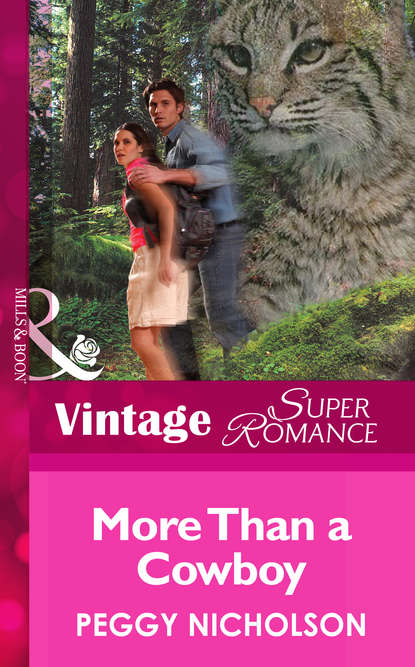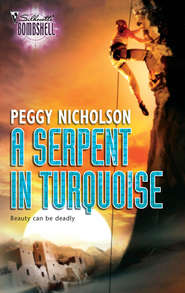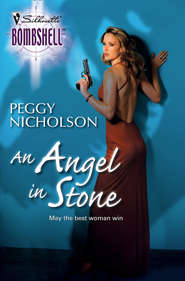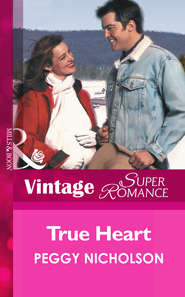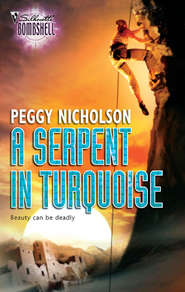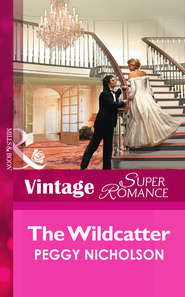По всем вопросам обращайтесь на: info@litportal.ru
(©) 2003-2024.
✖
More Than A Cowboy
Автор
Год написания книги
2019
Настройки чтения
Размер шрифта
Высота строк
Поля
He started to shrug, then caught himself. “What can I say? Women are crazy for badges. And uniforms. Can’t tell you how I hated giving mine up when I moved into Homicide. Was a real heartbreaker trade-off.”
“Yeah, I can see you’re hurting.” The cousins grinned at each other till embarrassment set in, and Gabe glanced down. He plucked at the sheet hem. “So…when do they let you out of here?”
“I’m leaving tomorrow.”
“That’s not what the nurse—”
“Tomorrow, or I start tossing TVs.” He hooked a thumb toward the racket beyond the curtain.
“Ah.” Gabe nodded understanding. “Okay, but after that? I suppose they’ll be giving you some recuperation time?”
“More than I’ll want.” Being a homicide detective wasn’t simply a job, it was a calling. Maybe if he’d had a woman or a family to distract him—but then, how could a good cop allow himself to be distracted?
The cases were endless and they were fascinating, and they tended to eat a man up. You might stagger home wired yet exhausted, night after night, but your job counted for something. You felt it made a difference.
Feeling like that, you didn’t tend to set it aside at the end of your shift, or switch your focus to the things that mattered to civilians. Because what hobby could be half as meaningful? What sport could give a man the same rush as going eyeball-to-eyeball with a gunman? What woman could compete with the adrenaline high of a righteous arrest?
Which was why so many detectives lived wistfully single in spite of themselves.
“That’s what I figured. So I was wondering…” Gabe still fingered the sheet. “Maybe once you’re back on your feet, you’d consider helping me out?”
Adam cocked his head. Gabe, the golden boy, needed his help? Gabe, who’d always had his ducks in a row, be they feminine, academic or professional. “Sure, but with what?”
“You know I’ve been working on the lynx reintroduction project? For four years now.”
“Big spotted cats, with goofy clown feet and Mr. Spock ears,” Adam remembered. “Bringing ’em back to Colorado.” Gabe had explained his mission with enthusiasm several Christmases back, when the project was just getting off the ground. He was a conservation biologist for the Colorado Division of Wildlife, DOW for short. A few years ago, the DOW had concluded that lynx had become an exceedingly endangered species in Colorado—there were maybe two left in the state, as far as anyone knew—and it was time to save the critters from extinction.
In spite of the howls of protest from the cattlemen and sheepmen and skiers, they’d imported a hundred or more of the big cats from Canada and Alaska. Then they’d freed them in the San Juan Mountains, the wildest, roughest region of the southern Rockies, hoping they’d go forth and multiply. “You brought in the fleabags at a thousand a pop, I think you told me. So?”
Gabe turned up his hands and showed them empty. “So then…where are they?”
CHAPTER TWO
“WILL SHE LIVE?” Standing across the exam table from the veterinarian, Tess cupped one of Zelda’s outsize paws between both her hands.
Dr. Liza Waltz glanced up from the sedated lynx, then down again at the thermometer she held. Her sandy brows drew together. “I don’t know yet. Three degrees above normal.” She set the thermometer briskly aside and returned with a stethoscope.
Tess stroked silky gray, black and buff-brindled fur and watched anxiously as the examination proceeded. Waltz was supposed to be the best vet for exotic cats in Santa Fe. After each of four phone calls to local vets had brought up the woman’s name, Tess had driven straight to her office. The vet had interrupted a scheduled appointment to walk out to Tess’s pickup. She’d peered into the cage in the truck bed, which Tess had covered with a tarp against the wind, sworn under her breath, then run back for sedatives and a noose pole to control the cat.
Zelda had been too weak to fight the injection. Within minutes Waltz had her on the table, and now Tess bit her bottom lip as she waited for a verdict.
The vet muttered something to herself and removed the stethoscope from her ears. “Not good,” she allowed, fixing Tess with accusing gray eyes. “How long has she been this way?”
“I don’t know.” Tess explained how she’d acquired the lynx, and from whom. “Hazeltine mentioned there’d been a second lynx, a male, who shared Zelda’s cage.”
“Two in a cage that size!”
“Exactly. He bought them from the same fur farm last year. I asked him what had happened to the male, and he hemmed and hawed, then told me he’d sold him a few days ago to somebody who needed a barn cat. But frankly, I think he was lying. My guess is the male died, and it suddenly occurred to Hazeltine that I might back out on the deal if I thought Zelda was that sick. So he spun me a feel-good story instead.”
Waltz growled something under her breath as she switched her attention to the cat’s belly. Her gaze grew distant while her fingers gently kneaded and squeezed.
“Checking for pregnancy?”
“Right, although she’d have to be four or five weeks along for me to feel kittens. Or for an ultrasound to show them. Is there any chance she could have been bred in the past week or two?”
Tess turned up her palms. “I suppose anything’s possible. But given the size of their cage, and that the male was removed recently, and that he may have been ill—”
“Seems unlikely,” the vet agreed. “Malnourished as she is, it’d be a miracle if she could conceive, even if she were bred. So…” She patted the lynx’s shoulder, then turned to a refrigerator in the corner. She stood, considering vials for a moment, then chose one and reached for a syringe. “I’ll have to culture her saliva to be sure, but we’re going to assume it’s not simply viral pneumonia—that by now she’s got bacterial complications. We’ll see if a bolus of antibiotics can knock it back while I’m waiting for the results.
“Meanwhile she’s dehydrated and underfed, so I’ll run an IV line. Give her saline and glucose for now. Tubal feeding by tomorrow if she isn’t eating.” Her left hand probed delicately across a gaunt gray haunch, then she set the needle, injected its contents and glanced up at Tess. “If I can save her, this isn’t going to be a cheap fix. She’s badly run down.”
Tess grimaced in agreement. And there was no way she could go to her father for help on this one. Ben Tankersly might have more money than God, but like most cattlemen, he wasn’t fond of predators. He’d tell her the only good lynx was a dead one, and he had his own stuffed specimen in his office to underline the point.
But Tess had worked each summer through college, and socked every spare penny away. Like both her older sisters, she’d learned early that if she didn’t want to dance to her domineering father’s tunes, she had to pay her own piper. “I can handle it.”
Waltz pried open the lynx’s jaws and bent close to study her curving fangs. Gently she lifted the gums aside to reveal the back teeth. “All intact. That’s something, anyway. So what did you pay for her, if you don’t mind my asking?”
“Two hundred dollars.”
“Pretty steep for a half-dead cat.”
“Now ask me what he wanted for the cage,” Tess suggested, straight-faced, then added as the vet raised an inquiring eyebrow. “Five hundred.”
As they burst out laughing, she realized that here was somebody who might become a friend. They clearly shared the same passion for animals. Though the vet was inches shorter than Tess’s slender five-foot-seven, she had a combative bounce and an intensity that made her seem much larger. Tess suspected she couldn’t have picked a better ally to help her save this cat.
“Slick,” Liza Waltz agreed, when she could speak.
“Very slick. I was tempted to say, ‘keep your crummy ol’ cage,’ but then I took another look at Zelda’s fashion accessories.” Tess pressed a thumb gently against the center pad of the cat’s forepaw. Saber-sharp claws flexed into view, then retracted as she released the pressure. “And I thought…mmm…well, yeah. Maybe I don’t want her riding in my cab, till we’ve gotten to know one another better.”
“I should probably tell you this after you’ve paid my bill, not before, but…even if I can save her, if you’re thinking you’ve bought yourself a thirty-pound lap cat, you’d better think again. Lynx make rotten pets.”
“No, she’s a wild animal. I understand that.”
But Waltz had already launched into a passionate lecture that she’d obviously made before. “If I had a dollar for every bozo who thought he wanted a lion or a tiger or an ocelot for a pet! I mean, sure, it’s a wonderful fantasy—I wanted a cheetah when I was ten. But reality’s quite another thing. For instance, this kitty…” She paused to smooth her hand across the lynx’s soft tawny and cream-colored belly. “Once she gets her strength back, she’ll be able to clear twenty-four feet in a single bound. Now picture that in your living room.
“And will she scratch the furniture? Oh, baby—we’re talking shreds! Ribbons! She’ll go through a couch a week if you give her the run of your place.
“And as for spraying…male or female, spayed or unspayed, exotic felines mark their territory—and you—and everything else they can find to anoint. And we’re talking buckets.”
“Euuuw! No, I’m not up for that.”
“But I can’t tell you how many people are—till they try to live with a wild cat. Then once they do figure it out, they come crying to me or the zoo or the pound or a big cat sanctuary, because although they love their pet, they just can’t keep it. So naturally, they want to find a loving, happy home. But…”
“But?” Tess fingered a black-tasseled ear. Yes, she could see how someone could fall in love with the idea of owning a lynx.
“But since people just keep on buying and trying, seventy or eighty of these animals come up for adoption each year in this country. Every last zoo is full to overflowing—they don’t need another lynx. The big cat sanctuaries are desperate for operating funds and cage space. They can’t afford to take on more pets-gone-bad. If the pound dares to place a lynx, then it just comes bouncing back again, once the new family gives up. So…” The vet shrugged, turned away, washed her hands at the sink.
“So?” Tess wondered.





